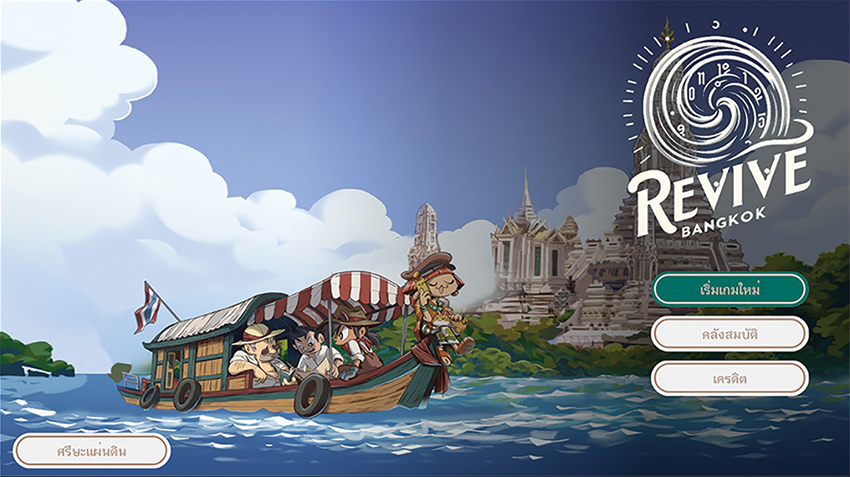Revive Bangkok: Designing Digital Game-Based Learning for Bangkok History
Main Article Content
Abstract
This research aims to experiment with digital game design to promote historical learning, a prevalent issue in many countries but relatively new in Thai society. Several studies have suggested that the "play and learn" or "play-based learning" method is effective for children and young people. This method involves creating or simulating game-based scenarios in various ways, including online games.
Despite their design efforts, most historical games have been unsuccessful in Thai society. A few historical games did achieve success, but they were not designed for learning history. This research identifies a significant academic gap in history teaching, which should receive more attention.
To address this gap, this research integrates historical knowledge, archaeological evidence, architecture, and various art forms, including written documents, old photographs, artifacts, and maps, into the design of the digital game "Revive Bangkok."
The primary target audience is high school and university students between the ages of 13 and 25, the primary age group for learning history through the formal education system. The game's design is based on three key concepts: the "overlay of Bangkok city area," which is a theme in historical studies; "fun, suspense, and questioning," which combines historical learning with gaming; and "the beauty of scene and character," which is crucial for engaging players.
"Revive Bangkok" is an educational digital game that teaches the history of the city in the form of a "Role-Playing Game" (RPG) in the "Puzzle Adventure" genre. The main storyline involves players collecting antiques and solving various puzzles in the old city of Bangkok, both in the present and the past, to solve the city's flooding problem, as predicted by ancient scripture.
The mission encourages players to ask questions about Bangkok's history, which is the primary goal of the game's design. It aims to provide a different perspective on learning history, creating a comprehensive and new "past" pattern with a rich and holistic "new" perspective. It also stimulates the imagination, promoting an understanding of history beyond mere memorization and fostering a foundational thought process that can lead to other ideas in the future.
Downloads
Article Details

This work is licensed under a Creative Commons Attribution-NonCommercial-NoDerivatives 4.0 International License.
References
Bruce, Tina. Learning Through Play: For Babies, Toddlers and Young Children. 2nd ed. London: Hodder Education, 2011.
Carr, Edward Hallett. What is History?. New York: Vintage, 1961.
Chatri Prakitnonthakan. “Symbolism in the Design of Wat Phra Chetuphon Wimonmangkhalaram.” Journal of the Siam Society 102 (2014): 1-40.
Chatri Prakitnonthakan and Kannika Suteerattanapirom. Fư̄n chīwit Krung Thēp... [Revitalizing Bangkok]. Bangkok: Parbpim, 2022.
Dietze, Beverlie, and Diane Kashin. Playing and Learning in Early Childhood Education. 2nd ed. Toronto: Pearson Canada, 2018.
Gkogkidis, Vasilis. Designing Games and Gamification for Learning. London: Bookboon, 2020.
Hammer, Jessica, Alexandra To, Karen Schrier, Sarah Lynne Bowman, and Geoff Kaufman. “Learning and Role- Playing Games.” In Role-Playing Game Studies: A Transmedia Approach. Edited by José P. Zagal and Sebastian Deterding, 283-299. London: Routledge, 2018.
Hodgson, John. Archaeological Reconstruction: Illustrating the past. London: Institute of Field Archaeologists, 2002.
Issar, Kriti. “Students’ Attitude Towards Studying History and Teaching Practices.” Education Quarterly Reviews 4, 3 (2021): 45-50.
Kannika Suteerattanapirom. Bōrānnakhadī mi wō̜ yom Sayām [Archaeology of Museum Siam]. Bangkok: National Discovery Museum Institute, 2020.
Kemp, Simon. DIGITAL 2024: THAILAND. Accessed April 25, 2024. Available from https://datareportal.com/reports/digital-2024-thailand
Kostof, Spiro. The City Shaped: Urban Patterns and Meanings through History. New York: Bulfinch Press, 1993.
McCall, Jeremiah. “Teaching History with Digital Historical Games: An Introduction to the Field and Best Practices.”Simulation & Gaming 47, 4 (August 2016): 517-542.
MGR Online. Poē t tūa kēm Thai fō̜m yak “Tamnān som det phra Narēsūan mahārāt ʻō̜ na lai [Launch of a Great Thai Game “King Naresuan Online”]. Accessed April 25, 2024. Available from https://mgronline.com/game/detail/9530000002241
Nenin Ananbanchachai, President of Thai Game Software Industry Association. Interview, April 19, 2023.
Prachachat Business. Talāt kēm 3.7 mư̄ nlān bō̜risat Thai mī sūanbǣng thaorai [What is the Market Share of Thai Companies in the ฿3.7 Ten Thousand Million Game Market?]. Accessed April 25, 2024. Available from https://www.prachachat.net/ict/news-1379692
Prager, Richard Heinz Patrick. “Exploring the Use of Role-playing Games in Education.” Master of Teaching Research Journal 2 (2019): 1-8.
Randi, Marco Antonio Ferreira, and Hernandes Faustino de Carvalho. “Learning Through Role-Playing Games: an Approach for Active Learning and Teaching.”Revista Brasileira de Educação Médica 37, 1 (2013): 80-88.
Santi Pakdeekham and others. Sathāpat wat Phō [Architecture of Wat Pho]. Bangkok: Amarin Printing and Publishing Public Company Limited, 2009.
Schiffer, Michael B. “Archaeological Context and Systemic Context.” American Antiquity 37, 2 (April 1972): 155-165.
Schiffer, Michael B. “Toward the Identification of Formation Processes.” American Antiquity 48, 4 (October 1983): 675-706.
Schrier, Karen. “Using Digital Games to Teach History and Historical Thinking.” In Learning, Education and Games. Edited by Karen Schrier, 73-91. Pittsburgh: ETC Press, 2014.
Schut, Kevin. “Strategic Simulations and Our Past: The Bias of Computer Games in the Presentation of History.”Games and Culture 2, 3 (July 2007): 213-235.
Songklod Limpipat. Home Sweet Home : Bư̄anglang kēm phī fī mư̄ khon Thai thī lō̜klō̜n klai thưng tāngprathēt [Behind the Scenes of the Ghost Game, Developed by Thai and Creating Dread Overseas]. Accessed April 26, 2024. Available from https://adaymagazine.com/draft-home-sweet-home/
UNESCO World Heritage Centre. UNESCO Recommendation on the Historic Urban Landscape. Accessed April 26, 2024. Available from https://whc.unesco.org/uploads/activities/documents/activity-638-98.pdf
Wilawan Inchamnan and Karuna Yampray. “Creative and Learning Processes using Game-Based Activities.” Journal of Reviews on Global Economics 6 (2017): 355-366.
Zin, Nor Azan Mat, Azizah Jaafar, and Wong Seng Yue. “Digital Game-based learning (DGBL) model and development methodology for teaching history.” WSEAS Transactions on Computers 2, 8 (February 2009): 322-333.


